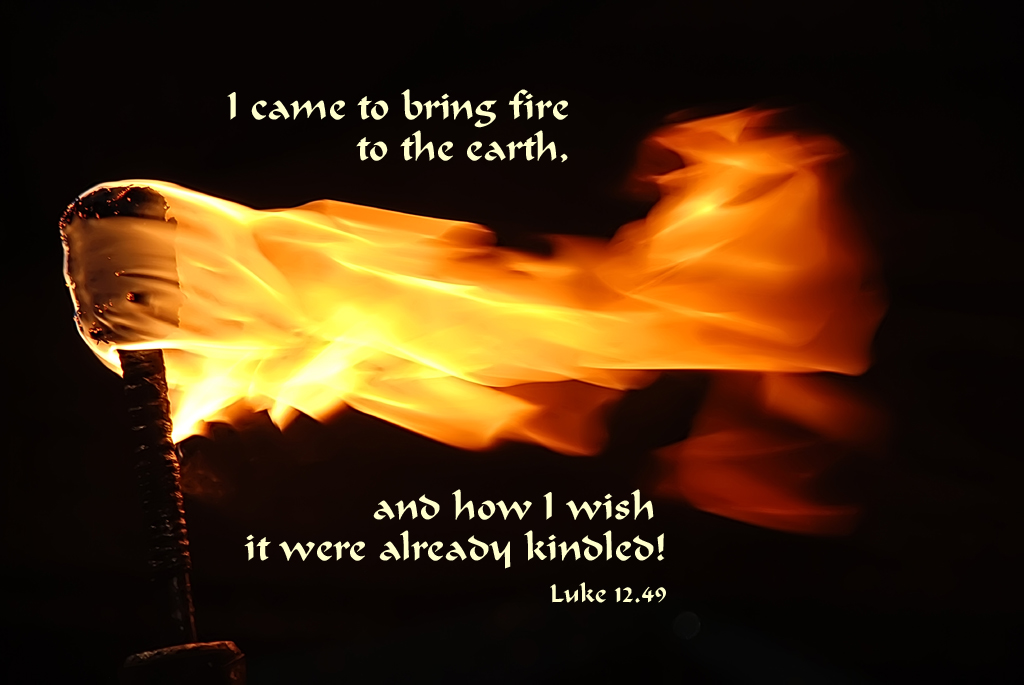Proper 15 C; August
18, 2013
Isaiah 5:1-7
Psalm 80
Hebrews 11:29-12:2
Luke
12:49-56
It seems impossible to be reminded of the end of the world
on such a glorious mid-August morning as yesterday, but the New York Times
managed to do it. According to an op-ed writer, the Palisades of the Hudson,
just north of the George Washington Bridge, are “a reminder of a cataclysm and
mass extinction.”
The cliffs were once underground channels of molten rock
that fed widespread volcanic eruptions 200 million years ago as the
supercontinent Pangaea pulled apart at the seams. The eruptions covered more
than four million square miles with basalt lava and belched vast amounts of
carbon dioxide and sulfur into the atmosphere. Brief volcanic winters followed,
but the eruptions also set off an ocean-acidifying, global-warming catastrophe
that wiped out three-quarters of life on earth. This was the end-Triassic
extinction, which cleared the way for the dinosaurs and their domination of the
planet for the next 136 million years, before a giant asteroid struck Mexico
and ended their reign.
Really? Do I really need to be reminded of all of this on a
serene, crystal clear morning, as I sip my coffee and look out at my garden?
And then, of course, the even-worse kicker:
“In terms of global warming and ocean acidification,” … the
rate of change during the end-Triassic extinction “was comparable to what we’re
doing today.”[i]
Today, it seems, you can run but you cannot hide. In the
gospel, Jesus seems to forget that his nickname is “Prince of Peace”[ii]
– the words of hope our very same prophet Isaiah wrote when he was not bitterly
condemning us for faithlessness and violence, telling us how God will destroy
the very garden he gave us to
live in because we have become sour and wild.
This theme is echoed in Psalm 80, a psalm of communal lament: God has abandoned
us, left our gardens and communities desolate, and we beg God for help. With
God-given leadership, we say, we will never turn away from God, we promise.
Restore us, give us life, God, give us light, and we shall be saved.
At the same time that these Bible readings take us
simultaneously to ancient history and to the futuristic end of time, we are grabbed
and brought to today: Egypt is all over these lessons: violence, bloodshed,
familial fighting, endless division and conflict. The Epistle to the Hebrews is
ripped from the headlines: torture, flogging, chains and imprisonment, stoned
to death, destitute, tormented, wandering in deserts and mountains, in caves
and holds in the ground. “I came to bring fire to the earth,” Jesus said –
fire, the prophet’s way to speak of the judgment of God. Can you not see the
signs of these times, Jesus asked the crowd who came to hear the Prince of
Peace. You know how to interpret the appearance of earth and sky – you can read
the stock reports and the housing sales and the consumer price index; you even
know what the fossils are telling you in the geologic record of billions of
years ago – but why do you not know how to interpret the present time?
As much as we might NOT want to read these things in the
Bible, here indeed they are and always have been. Difficult texts, yes, but
real. No easy answers. Our lives and times, troubling and tormented, laid bare.
The wounds in our human nature revealed. Our micro-troubles, with our personal
shortcomings – anger with our families, unhappiness at work, sickness, greed,
envy – all that and more wrought large, on a global scale. God shines klieg lights
on all the bad stuff.
We are relieved to find one human in this whole bunch of prophets
and lamenters: the writer of the Epistle to the Hebrews. What a blessing to
find someone who puts all these hard times in context, who finds meaning and
redemption even in the midst of terror and despair. “By faith,” when terrible
things happen, we are not destroyed. The Epistle to the Hebrews puts us in the
middle of that great stream of time, where we see the struggles of those who
have gone before right here next to ours and connected as well to those who
will come after us. We run toward the promises of God, the goal we have always
sought, the story of God and humanity and this whole created order that is
still unfolding. We cannot pretend that things we do not like are not
happening, for this writer reminds us that it is in the midst of even the most
terrible of circumstances that God’s story is revealed, God’s truth is made
known, God’s grace surrounds us.
Jesus told us to pray that God’s kingdom and God’s will
would be done. It was no more finished when Jesus walked the earth, died and
rose from the dead than it is now. But for Jesus, and for us, if we would but
read the signs around us, in our times, we would see that God’s purposes are
unfolding, even now, even here, even in our own lives, as those purposes unfolded
in the lives of those the writer to the Hebrews calls the
pioneers of faith.
Short of stopping global warming or negotiating a peaceful
settlement between the Muslim Brotherhood and the Egyptian military, what can
we do, even in the midst of our own challenges, to work toward that Kingdom
goal Jesus set for us? To align ourselves with the purposes of God? To keep
faith with those who have run this race before, and to pass on to those who
come after us this same promise of God’s grace that we have received?



No comments:
Post a Comment